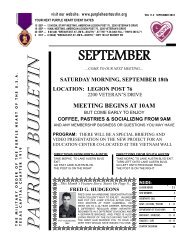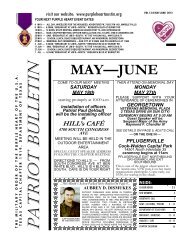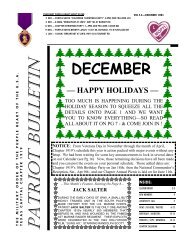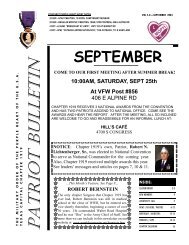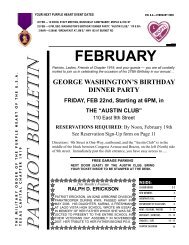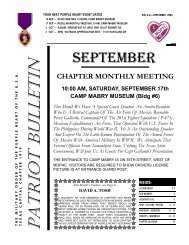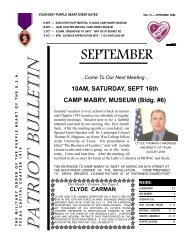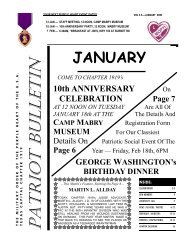PATRIOT BULLETIN - Military Order of the Purple Heart
PATRIOT BULLETIN - Military Order of the Purple Heart
PATRIOT BULLETIN - Military Order of the Purple Heart
You also want an ePaper? Increase the reach of your titles
YUMPU automatically turns print PDFs into web optimized ePapers that Google loves.
Page 9<br />
<strong>PATRIOT</strong> <strong>BULLETIN</strong><br />
was a horse staring me in <strong>the</strong> face. Bringing livestock into <strong>the</strong> farmhouse to conserve heat in <strong>the</strong> Winter<br />
was common in Europe but wasn’t what I’d expected.”<br />
After about six-months in Ireland, in April 1944 <strong>the</strong> division was moved over into sou<strong>the</strong>rn Wales, landing<br />
at Pembrokeshire, and was positioned at various places in Glamorganshire where <strong>the</strong>y spent <strong>the</strong> remaining<br />
weeks in preparation. When <strong>the</strong> invasion came, 2d Infantry Division was part <strong>of</strong> <strong>the</strong> forces embarked in <strong>the</strong><br />
Bristol Channel that crossed over to France <strong>the</strong> following day and landed at Omaha Beach on D+1, June 7,<br />
1944. Herman Haydon’s 9 th Infantry Regiment, as part <strong>of</strong> <strong>the</strong> division, was immediately committed to<br />
action enlarging <strong>the</strong> beachhead and was part <strong>of</strong> <strong>the</strong> next three day’s fighting. By June 10 th <strong>the</strong> regiment had<br />
crossed through Cerisy forest outflanking Trevieres and resulting in liberation <strong>of</strong> <strong>the</strong> town. In <strong>the</strong> days and<br />
weeks afterward <strong>the</strong> division proceeded in <strong>the</strong> direction <strong>of</strong> St. Lo, securing Hill 192, a key enemy strong<br />
point on July 11 th . Herman was wounded on July 27 th when still fighting in <strong>the</strong> hedgerows <strong>of</strong> <strong>the</strong> bocage<br />
country in Normandy. Today he says, “A German machine gun opened up and I was hit in both legs. At<br />
<strong>the</strong> time, I believed that one <strong>of</strong> my legs had been shot <strong>of</strong>f, and in fact it had been nearly severed. No one<br />
was with me and I had to crawl to reach <strong>the</strong> safety <strong>of</strong> <strong>the</strong> hedgerow.” He was taken back to a field hospital<br />
and <strong>the</strong>n sent to a General Hospital at Hereford, England. After one month and 20 days in Normandy, <strong>the</strong><br />
war was over for him.<br />
After months in <strong>the</strong> hospital in England, Herman Haydon was shipped back to <strong>the</strong> United States. He<br />
arrived in Boston on January 4, 1945 and was told he would be sent to a hospital near his home. Instead, he<br />
was sent to Hammond General Hospital in Modesto, California, and he wasn’t <strong>the</strong> only one. Herman says,<br />
“During my nearly five years service, I had never run across anyone else from home, but in Modesto <strong>the</strong>re<br />
were three or four men in <strong>the</strong> hospital <strong>the</strong>re with me that were all from Leander, Texas.” Herman was<br />
transferred to a Convalescent Hospital near San Diego, but after only a few weeks <strong>the</strong>re it was determined<br />
that he was not ready for convalescence, but still required treatment <strong>of</strong> his wounds. As a result, he was<br />
transferred to Bushnell General Hospital at Brigham City, Utah. He had been granted brief furloughs home<br />
and during one such visit he had met a Miss Edith Guynes, a girl from Elgin. In June 1945, on a furlough<br />
home from <strong>the</strong> hospital in Utah, Herman and Edith were married. The doctors at Bushnell Hospital had<br />
plans for his continued treatment, but Herman insisted and he was granted a disability discharge on<br />
November 29, 1945.<br />
After his return home, Herman says, “There were many discharged servicemen everywhere, all looking<br />
for jobs. I got a job at Camp Swift working with German P.O.W.’s under my supervision. When <strong>the</strong> camp<br />
was closed out, I did vocational training at Austin High School under <strong>the</strong> G.I. Bill, and <strong>the</strong>n worked at<br />
several local businesses. I was with <strong>the</strong> Marfus Company for about six months, <strong>the</strong>n worked for Rainhart<br />
Company producing laboratory test equipment for soils and materials. After that I did some machine work<br />
for W.F. Smith and Son and <strong>the</strong>n in 1952 had been with Modern Supply Company only a few months when<br />
I was interviewed and hired for a job with <strong>the</strong> University <strong>of</strong> Texas.” Herman was employed by <strong>the</strong><br />
university’s department <strong>of</strong> Engineering Mechanics at Balcones Research Center, and later transferred to <strong>the</strong><br />
Petroleum Engineering Department on main campus, and lastly closed out thirty-years with The University<br />
when he retired from <strong>the</strong> Department <strong>of</strong> Chemical Engineering in 1983. His entire career was in research<br />
instrumentation, fabricating equipment used in engineering science, and he proudly reports having built<br />
instruments that NASA had sent to <strong>the</strong> moon. In <strong>the</strong> meanwhile, Herman and Edith had a family <strong>of</strong> four<br />
sons; James Ray who had served in <strong>the</strong> Navy, Ronald Edwin <strong>of</strong> Cedar Creek, Terry Joe a Marine Corps<br />
Vietnam veteran coping with Agent Orange related conditions, and Philip Randal <strong>of</strong> Cedar Creek. After<br />
having been married for over 60 years, Edith passed away in 2006. Their eldest son James is also deceased.<br />
Herman joined <strong>the</strong> <strong>Military</strong> <strong>Order</strong> <strong>of</strong> <strong>the</strong> <strong>Purple</strong> <strong>Heart</strong> as a life member shortly after our chapter was formed<br />
and throughout <strong>the</strong> early years Herman and Edith had regularly attended meetings toge<strong>the</strong>r; now in recent<br />
years he is most frequently seen at our breakfast get toge<strong>the</strong>rs. This month <strong>PATRIOT</strong> <strong>BULLETIN</strong> proudly<br />
salutes Patriot Herman Haydon.



